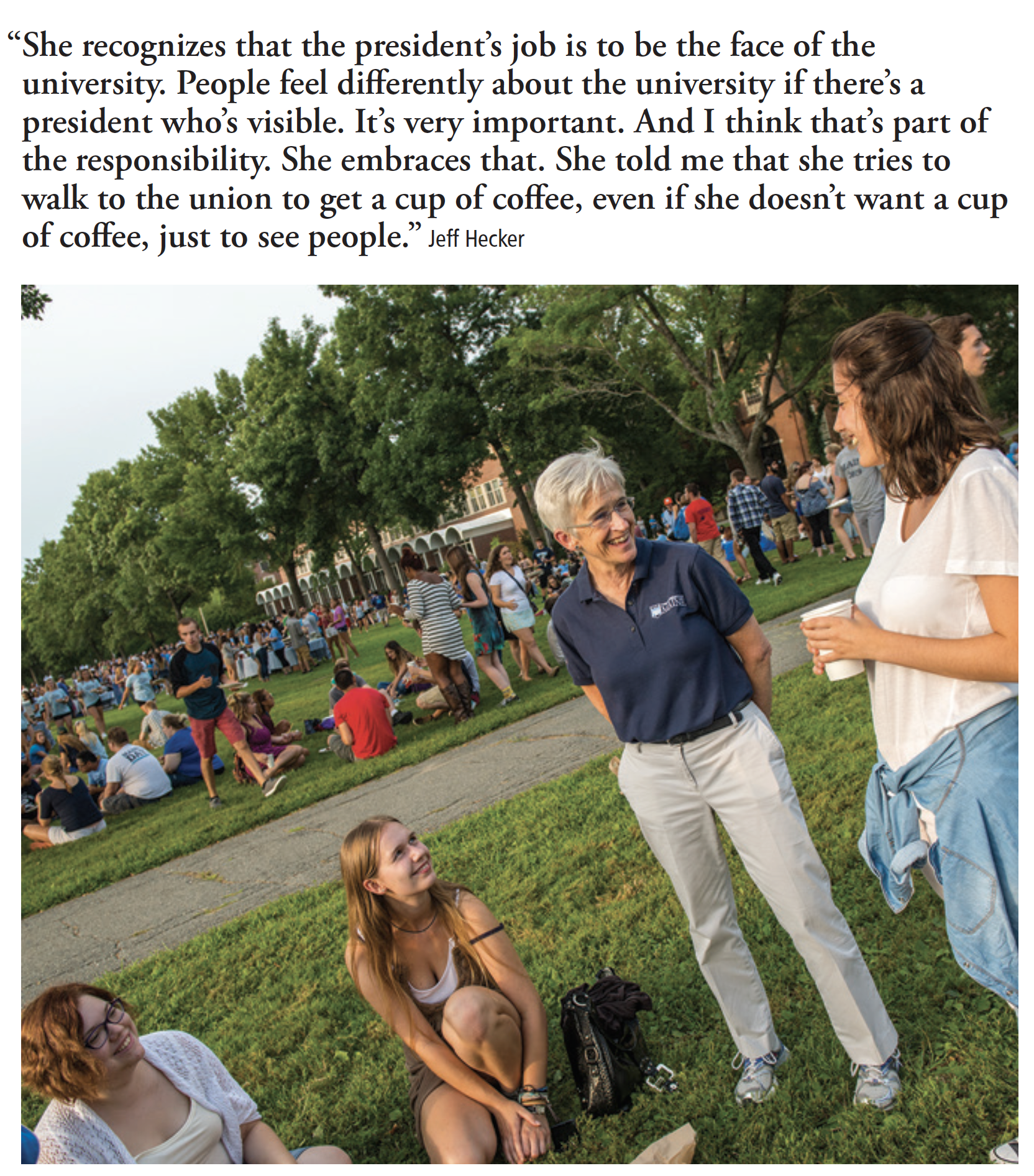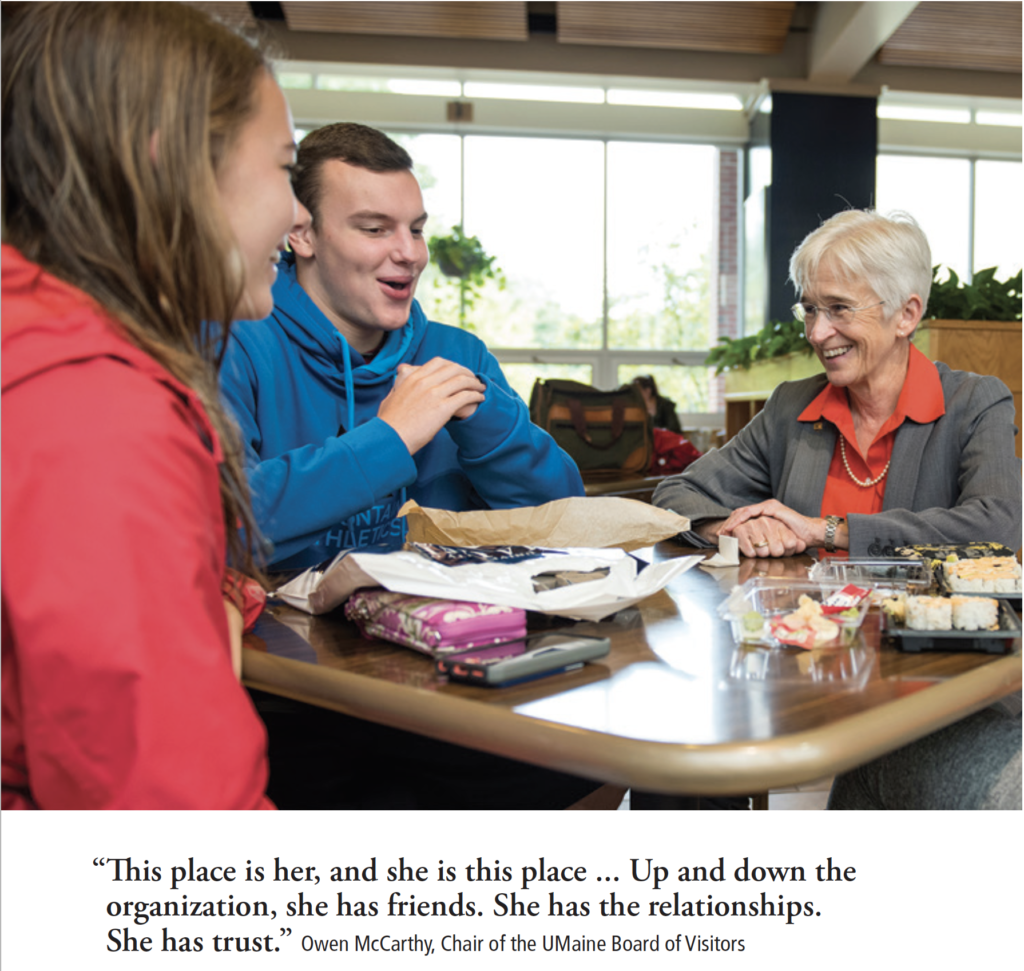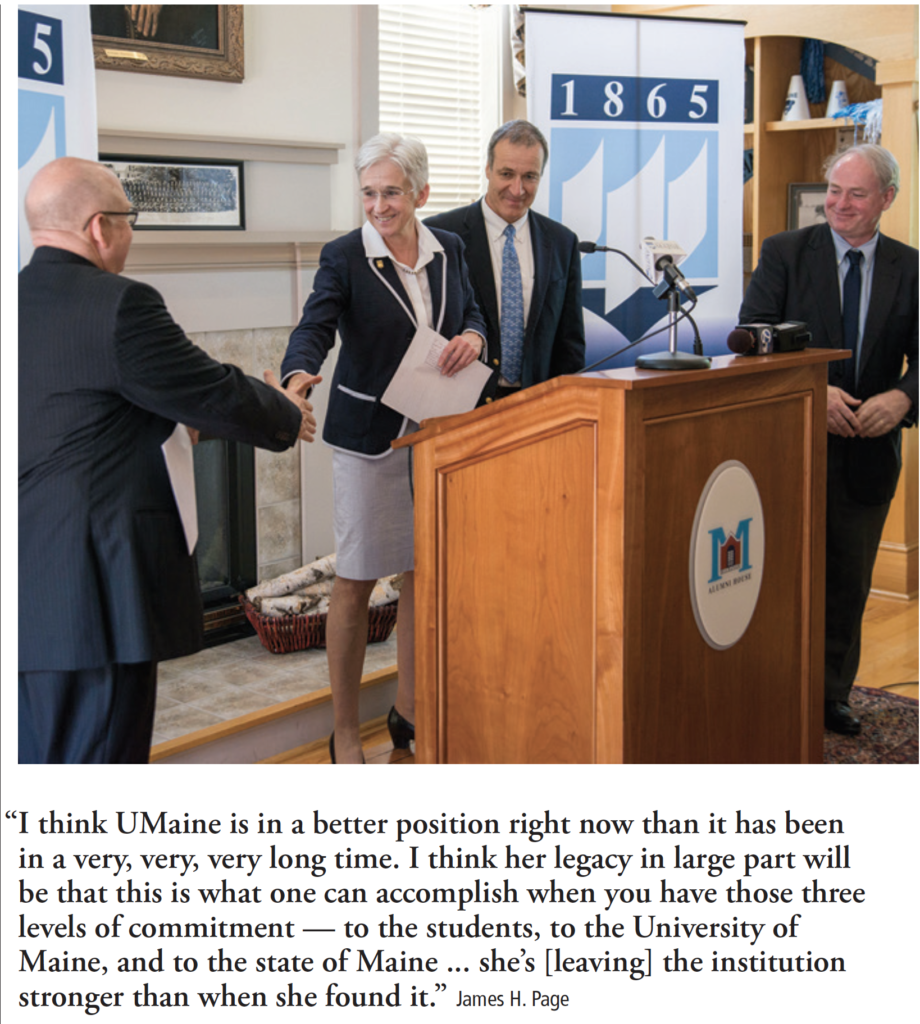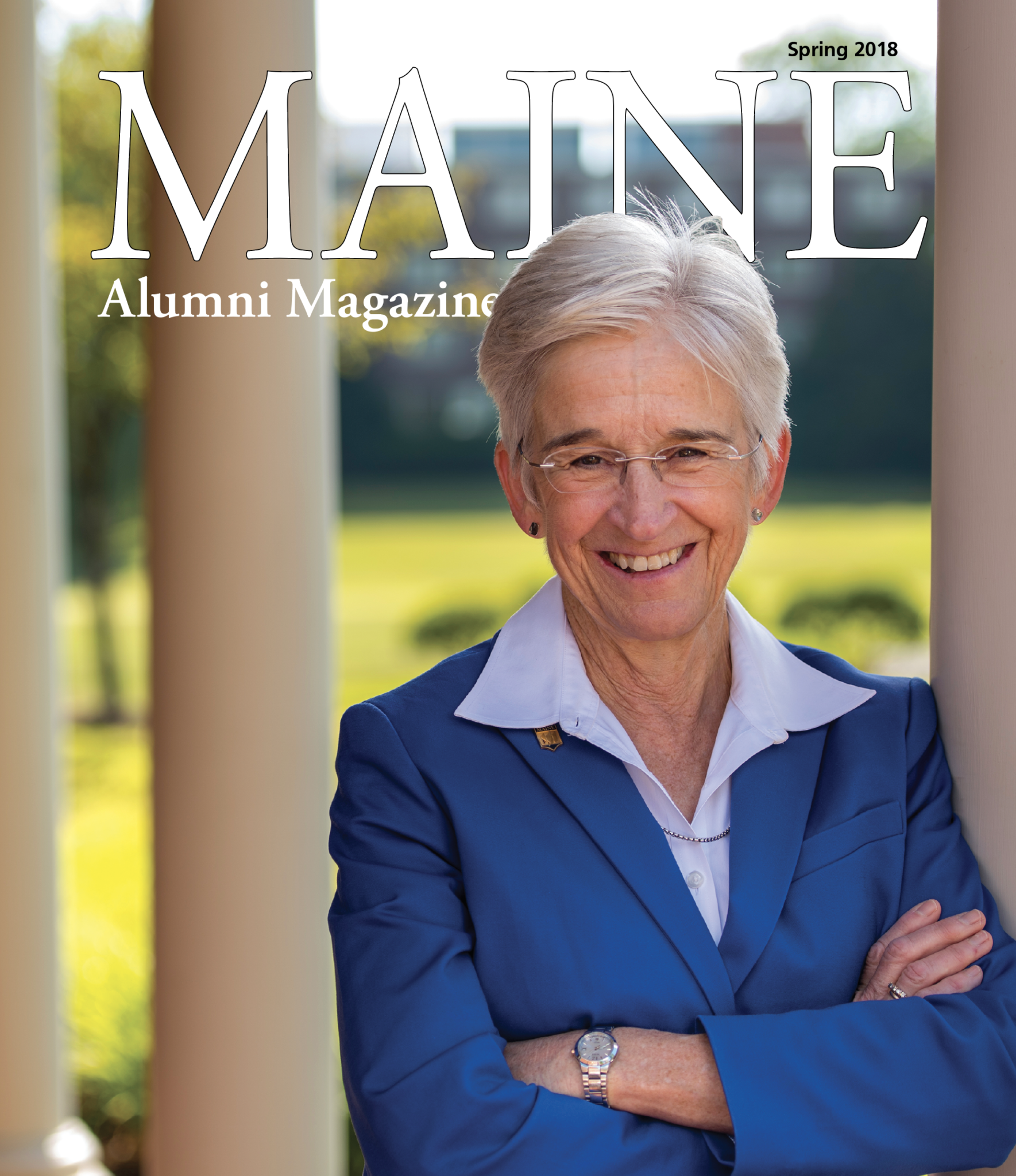ON A BRIGHT MORNING IN EARLY MARCH , University of Maine President Susan J. Hunter gave an impromptu tour of the Alumni Hall office suite she shares with four others.
Her typically energetic pace slowed for a moment as she reflected on the menagerie of memorabilia showcased on the walls. A Black Bear hockey jersey with her name on it (“Hunter 1”) hangs just above the computer in Hunter’s personal office. Among leather-bound books and various framed awards are special gifts she has received during her presidency: a Paul Bunyan statue given to her by the Bangor Region Chamber of Commerce when she received its 2018 Catherine Lebowitz Public Service Award; a ceremonial beer stein from her induction as an honorary member of All Maine Women, a prominent student honor society; a model of a wind turbine; a fish landing net made in Passadumkeag by a company with ties to the university; a tiny wooden golf cart emblazoned with campus symbols; an impeccably crafted model canoe.
The objects in the suite are eclectic and tell of her long ties and deep love for both the state of Maine and the University of Maine. It’s easy to imagine it will be hard for her to pack up at the end of June, when she leaves the presidency and moves into a retirement that is as yet undefined.
“It’s been an incredible honor to be the president of the University of Maine,” she said. “I view it that I work for the people of Maine, and I love to say it that way. So it’s really been a privilege.”
HUNTER CHEERFULLY DESCRIBES herself as a “campus rat.” She began her career at the university 30 years ago. She, her husband David Lambert, and their two children had relocated to Orono from Pennsylvania following Lambert’s appointment to UMaine’s plant pathology faculty.
Hunter, who had earned a Ph.D. in physiology from Penn State, initially accepted a part-time position at UMaine as an adjunct instructor in zoology. Over the next three decades she rose through the academic and administrative ranks: Full-time faculty member. Department chair. Associate provost and dean of undergraduate education. Vice President for Academic Affairs and Provost. Executive vice president. Vice chancellor for academic affairs for the University of Maine System. At age 63 it appeared that she had reached the pinnacle of her career.
Then, in 2014, UMaine President Paul W. Ferguson abruptly resigned to accept a university presidency in another state. In response, University of Maine System Chancellor James H. Page turned to the seasoned Hunter to take over Maine’s flagship institution.
Now, four years later, Hunter is not letting up as she prepares for retirement in June. Though hers was a sudden presidency — one instigated by Ferguson’s unexpected departure and Page’s rapid response — Hunter is leaving an admirable legacy.
Yes, she was the first woman in UMaine’s history to serve as president. But surely her tenure will be remembered for many things beyond that fact. Under Hunter’s leadership UMaine has achieved significant enrollment growth, stable finances, record high fundraising, positive relations with public policy makers, and increased morale on campus. The combination has greatly enhanced UMaine’s reputation as Maine’s most valued educational partner and resource.
 “I think UMaine is in a better position right now than it has been in a very, very, very long time,” System Chancellor Page said. “I think her legacy in large part will be that this is what one can accomplish when you have those three levels of commitment — to the students, to the University of Maine, and to the state of Maine … she’s [leaving] the institution stronger than when she found it.”
“I think UMaine is in a better position right now than it has been in a very, very, very long time,” System Chancellor Page said. “I think her legacy in large part will be that this is what one can accomplish when you have those three levels of commitment — to the students, to the University of Maine, and to the state of Maine … she’s [leaving] the institution stronger than when she found it.”
That positive outcome was in no way guaranteed when Hunter assumed the presidency in 2014. The state had been, and continues to be, fraught with both financial and demographic obstacles. Those challenges required the university to make innovative decisions about campus priorities, operations, and enrollment strategies.
Some ideas floated or tried during the early years of her presidency were received with skepticism at first. One of those was UMaine’s Flagship Match Program, a competitive scholarship program that has successfully attracted out-of-state students. Viewed by some at the time as a move of desperation, the addition of more out-of-state students has both helped UMaine financially and made it more appealing to in-state students seeking a more culturally and experientially diverse college experience. The Flagship Match program is now widely accepted by state policy makers and opinion leaders as well as by the campus community.
Hunter also led the implementation of strategic investments in faculty, scholarships, and facility improvements. The process stressed the importance of gathering stakeholder input and setting priorities. Though no
such undertaking at large organizations ever achieves universal agreement, those efforts have garnered widespread support.
OTHER CHANGES THAT OCCURRED on Hunter’s watch remain controversial in some quarters, such as the University of Maine System’s decision to integrate UMaine’s MBA program as part of a new Maine Center for Graduate Professional Studies in Portland. As people familiar with the action point out, it wasn’t Hunter’s idea or her decision to make; it was part of the System’s One University Initiative, which was intended to expand access to the university System’s academic offerings. Though physically based in Portland, the MBA will remain a UMaine degree in name, product, and stature.

Another System-inspired initiative — giving Hunter and UMaine administrative oversight of a sibling institution, the 800-student University of Maine at Machias (UMM) — has been embraced as practical and positive. As part of this change, Hunter was named president of UMM, making her the only person in the System’s history to serve as president of two universities simultaneously. UMM’s day-to-day operations in Machias are managed by Karen Kimball, who holds the titles of head of campus and vice president for academic affairs.
“I can count on her candor and clarity to give me the feedback I need to move the UMM mission forward,” Kimball said. “She is, quite frankly, one of the most honorable people I know — eminently fair, transparent, and insightful in her interactions.”
Emily Haddad, dean of the College of Liberal Arts and Sciences, said Hunter and her leadership team deserve great credit for the results achieved, especially in light of the circumstances.
“Look, you have to do a lot with a little. That’s a hard message,” Haddad explained. “President Hunter approached it in a humane, sensible, and well-informed way. Her agenda seems to be to do the best thing [for] the institution she can. [Hers] is not an ego-driven, ‘How can I make my mark?’ agenda. And that has been very well-timed for this university.”
That sense, of Hunter being a University of Maine community member first and foremost, is not lost on the university’s students, faculty, and staff . Hunter has simply been a constant presence on campus. She has been the kind of president who is just as likely to be found grabbing lunch at the Memorial Union and sitting in the dugout during a softball game as she is working with staff on the budget, or traveling back and forth to Augusta to work with lawmakers.
“This place is her, and she’s this place,” said Owen McCarthy ’10, chair of the UMaine Board of Visitors, the university’s senior-most advisory group. “It also helps that up and down the organization, she has friends. She has the relationship. She has trust.”
That’s who Hunter is, and also how the state of Maine works — a lesson she has internalized over her time at the university.
“So much of Maine, it’s very relational,” Hunter explained. “It’s a small state. We all tend to know each other, at a certain level, and if you’re not out and about and meeting with people, you’re just not operating the way we operate in Maine.”
Jeff Hecker ’86 Ph.D., UMaine’s executive vice president and provost, agrees. He has worked closely with Hunter for years and counts her as a friend. They talk shop in formal sit-down meetings and, more frequently, in informal conversations. They also travel together around the state. In this time, he’s learned about her leadership style, which is marked by friendships around the state and the spirit of collaboration, consideration, and
kindness.
“She recognizes that the president’s job is to be the face of the university,” Hecker added. “People feel differently about the university if there’s a president who’s visible. It’s very important. And I think that’s part of the responsibility. She embraces that. She told me that she tries to walk to the union to get a cup of coffee, even if she doesn’t want a cup of coffee, just to see people.”
HER COLLABORATIVE APPROACH also has paid off in terms of strengthening relationships while leading innovation. One notable example was the decision to eliminate the on-campus development office and turn over its responsibilities to the independent University of Maine Foundation. Along with increased cost-effectiveness and efficiencies, “People are no longer confused about where they are supposed to be sending their checks,” explained Jeff Mills ’82, the foundation’s president and CEO.
Since Hunter became president, she and Mills have been working on a comprehensive fundraising campaign, aiming to raise $200 million for a variety of student and campus needs. In March, they announced a $10 million anonymous gift to help construct UMaine’s top academic priority: a new engineering classroom and design center, a project expected to cost $80 million. (Approximately three-quarters of that amount has been secured so far.) Its construction will greatly increase UMaine’s ability to help address the state of Maine’s high demand for private- and public-sector engineers.

The recent gift was the largest single donation in the university’s history — and an important reference point in any discussion of Hunter’s legacy. According to Mills, Hunter’s personality has helped with both fundraising and campus morale.
“People just really find her somebody they like and enjoy being around. People know her and trust her,” he said. “Those are the qualities you hope you have in a leader.”
UMaine’s fundraising success has been helped along by the fact that Hunter and her husband, David (now retired from the faculty position that first attracted the family to UMaine), have also been generous donors. In fact, they belong to the school’s three major giving societies: the Stillwater Society, the President’s Club and the Charles F. Allen Legacy Society.
Longtime Vice President and Dean of Students Robert Dana ’80 said that her calm, focused leadership has been particularly appreciated during the changing, turbid political climate of the last few years. He said Hunter is committed to maintaining a campus community in which inclusivity and diversity are promoted and appreciated.
“To have somebody supporting those positions makes the life of a dean much easier,” Dana noted. “Th e president completely supports those efforts — and those are her values, too.”
Dana said that Hunter also has been a great role model for women in leadership.
“She brought a special bright light to thousands upon thousands of women at the university,” he said.
One of those students is 22-year-old Abby Bennett of Oxford, a senior majoring in economics and a member of All Maine Women. Bennett said that the president has been a very positive role model for her, as both a woman and a campus leader.
“I love Sue Hunter. She’s done a fantastic job as president,” she said. “She’s so down to earth and easy to talk to. She remembers people. She cares about students. She’s inspired me.”
Hunter said that is how she has approached her job. Not long after she became president, she was having a glass of wine with a friend at a Bangor restaurant when some women who were graduate students came up to them.
“They talked about how much it meant to them that a woman was president. One woman, she was teary,” she recalled. “And I thought: wow. It’s not that it doesn’t mean something to me, but I’m living it. I can’t think about that constantly. It would be like walking around with Mount Everest on your shoulders. You just have to do [the] job, and I recognize that how I do my job matters.
“Certainly early on, I’m sure people were looking to see how it was going to be, now that there was a woman in the job,” Hunter continued. “You’re aware that there’s scrutiny. That’s fine. I’m pretty competitive. I actually love to win, to be quite honest.”
THE FORMER COLLEGE ATHLETE expects to have more time to compete on the golf green after her retirement. She’ll also be settling in to the home that she and her husband have bought on Pushaw Lake and probably traveling more to visit their two adult children in Minneapolis and Seattle. This summer, Hunter also will chair the re-accreditation process for the University of Massachusetts Amherst. After that, though, what she’ll do in her retirement is an open question.
“I’ll have to get a paper route or something,” she joked.
No matter what she does, though, Hunter will surely bring the same positive leadership qualities to it. In her briefcase, she has an index card printed with “AHERB,” letters that remind her of the key attributes of a leader. Those are authenticity, honesty, empathy, resilience and bravery, and it’s safe to say that the University of Maine has benefited from those attributes for 30 years. Hunter is leaving the campus in a good position to welcome both her successor and the future.
“What better thing can a president do than set the standard for greatness?” Dana asked. “There can be no greater job than that.”
by Abigail Curtis
